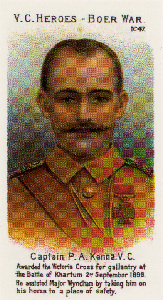Paul Aloysius Kenna

Cigarette Card VC Heroes
John Gall and Dorothy Hall have submitted the following:-
An extract from the "London Gazette." dated 15th Nov., 1898, records the following:-
At the Battle of Khartoum, on 2nd September 1898, Captain P.A. Kenna assisted Major Crole Wyndham, of the same regiment, by taking him on his horse, behind the saddle (Major Wyndham's horse having been killed in the charge), thus enabling him to reach a place of safety; and after the charge of the 21st Lancers, Captain Kenna returned to assist Lieutenant de Montmorency, who was endeavouring to recover the body of second Lieutenant R.G. Grenfell.
An extract from Lanchester Local History Society Journal No. 3 1992 A FOSTER-SON OF LANCHESTER by Frank McCombie.
Paul Aloysius Kenna was one of the best known and most popular soldiers of his day, and for several years he had been a familiar figure in Lanchester. Now his name, once a household word, is quite forgotten even there.
He was born in 1862 of well-to-do Irish parents who had settled in Liverpool. His father was James Kenna of County Meath, whose wife's sister was the mother of Paul, Cardinal Cullen, after whom Kenna was probably named. His mother was Julia Kearney, youngest daughter of Patrick Kearney of Eaglestown, County Meath, sometime High Sheriff of that county. Orphaned early in life, she came to live with her eldest brother Matthew at The Ford, Lanchester. Another of her brothers was Francis (later Canon) Kearney, the much-respected parish priest at High Brooms.
Matthew Kearney was perhaps the chief formative influence in Kenna's early life. When James died suddenly at Mentone in the south of France in December 1873, Julia brought Paul and his three brothers and two sisters to Lanchester, where they came under Matthew's care. Well known as a scrupulously fair magistrate, Matthew had five years before been made a Deputy-Lieutenant of the county, and in 1881 would be appointed High Sheriff. He was a keen rider to hounds, and the North Durham meets took place in a rotation which included The Ford, which he had purchased as Greenwell Ford from William Thomas Greenwell in 1852. He renamed it The Ford, but the contract gave the Greenwell's the option of repurchasing on Matthew's death. A big man himself, Kearney probably recognised the talent young Kenna had as a horseman and envied him his stature: Kenna was barely 5 feet 6 inches tall and very slightly built.
Kenna attended Stonyhurst College till August 1881 and by that time was determined to follow a military career. His uncle was doubtless concerned the following year in obtaining for him a commission in the 4th (Militia) Battalion of the Durham Light Infantry, the former North Durham Battalion. After two years, Kenna found that he had not been selected for commissioning into the Regular Army, and resigned in August 1884. He took the open competitive examination for entry into the Royal Military College Sandhurst, passed, and was accepted for entry that year: he was just over twenty-three years at that time. He passed out tenth in the class of 1886 out of a total of 146 candidates, a very fine performance.
The Durham Chronicle September 1915 reports:-
Brigadier General Paul Kenna, who was killed in the Dardanelles, was well known in Durham as the nephew of the late Canon F. Kearney of The Brooms, Leadgate, and the late Mr Matthew Kearney of The Ford, Lanchester, for many years chairman of the Divisional Magistrates. The gallant officer gained his V.C. in the famous charge of the 21st Lancers at Omdurman by riding back among the Dervishes on two occasions and bringing out Lieut. De Montmorency and Major Crole Wyndham.
He obtained his D.S.O. later in South Africa when he served under General Buller as Assistant Provost Marshal and distinguished himself in the Somaliland campaign by bluffing the Mad Mullah with a few hundred tired-out men and Camels of the Camel Corps and sending that potentate's main force flying before an imagined advance in force of the British.The Brigadier General was awarded the Royal Humane Society's Medal for saving a drowning man in Dublin in 1895. He subsequently commanded his own regiment in Egypt and a couple of years ago was the champion rider of the British Army in contests in London, Sweden and the United States.
His Victoria Cross is on display in The Queen's Royal Lancers and Nottinghamshire Yeomanry Museum in Thoresby Park, Nottinghamshire.
Awards: Victoria Cross; Distinguished Service Order; Queen's Sudan Medal (1896-97); Queen's South Africa Medal (1899-1902) with 6 clasps; Relief of Kimberley - Paardeburg – Dreifontein- Johannesburg - Diamond Hill – Belfast; King's South Africa Medal (1901-02) 2 clasps: South Africa 1901 - South Africa 1902; Africa General Service Medal (1902-5,6) 2 clasps: Somaliland 1902-1904 – Jidballi; 1914 - 15 Star; British War Medal; Victory Medal; + MiD Oakleaf; King Edward VII Coronation Medal (1902); King George V Coronation Medal (1911); Khedive's Sudan Medal (1896-1908), 1 clasp: Khartoum.
Paul Aloysius Kenna is remembered at Liverpool: Stonyhurst College, St Francis Xavier College; Town Hall, Abercrombie Square; Sandhurst; North Kilworth; and at Lanchester on L62.01

